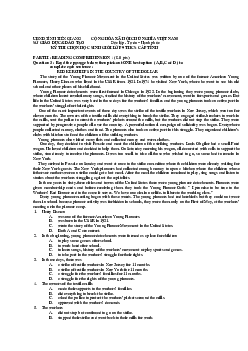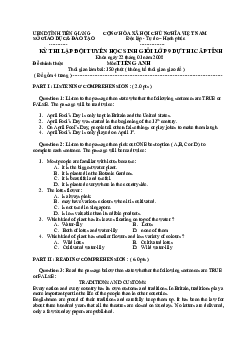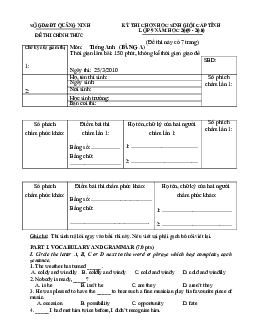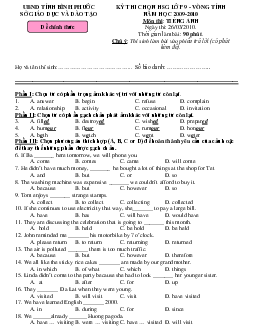






















Preview text:
THE GSE MOCK TEST for 9th GRADERS TIME ALLOTED: 150 mins
There are 2 PARTS in 2 differents papers.
No use of documentaries is allowed. INDOOR USAGE ONLY.
TURN OVER FOR THE EXAMINATION
Test begins in the following page.
A MULTIPLE CHOICE. 75 QUESTIONS 60 MINUTES
PLEASE TURN YOUR ANASWER SHEET TO THE SECTION OF MULTIPLE CHOICE AND BOLDEN YOUR CHOOSEN ANSWER.
SECTION i. PHONETICS/PHONOLOGY
SECTION iA: UNDERLINED STRUCTURE
SECTION iB: STRESS PARTERN
Direction: Choose the correct letter A, B, C or
Direction: Choose the correct letter A, B, C or
D whose underlined part pronounced
D whose stress partern is placed differently
differently from the others.
from that of the others. (1) A. houses (6) A. trigonometry B. faces B. explanatory C. horses C. immediately D. sources D. democracy (2) A. hauteur (7) A. legislature B. hauler B. repository C. haughty C. magneficent D. haulage D. mistake (3) A. macabre (8) A. argumentative B. machismo B. psychological C. chemical C. contributory D. chivalrous D. hypersensitive (4) A. external (9) A. photograph B. expurgate B. payroll C. extenuate C. accent D. expunge D. regretful (5) A. eureka (10) A. majority B. fervidly B. ceremony C. circumvention C. astronomy D. fermentative D. investiture
SECTION ii: GRAMMAR AND VOCABULARY
Direction: Choose the best answer A, B, C or D for each gap in the sentence. SECTION iiA. WORD CHOICE
1. You can’t believe a word that woman says – she is a _____ liar. A. dedicated B. devoted C. commited D. compulsive
2. There can be no _____ fixes or magic solutions to the problem of unemployment. A. fast B. speedy C. quick D. sudden
3. When you come down the hill, do drive slowly because it is not _____ obvious where turning is. A. immediately B. directly C. instantaneously D. quite
4. At her trial in 1431, Joan of Arc was accused of being in _____ with the devils. A. cooperation B. association C.league D. conjunction
5. When the forces on an object are balanced, you can say that the object is in _____. A. collusion B. equilibrium C. collision D. incubation
6. There were a number of strong candidates for the post but Peter’s experience _____ the scales in his favor. A. weighted B. tipped C. balanced D. overturned
7. We are conscious that sleeplessness usually _____ those who are exposed to a great deal of
stress, anxiety or depression. A. betrays B. bestows C. besets D. bemoans
8. I think that the artist’s cartoons are usually rather _______ as they are intended to appeal to a mass number of audiences. A. lowbrow B. highbrow C. dearly D. impenetrable
9. The train service has been a _____ since they introduced the new schedules. A. shambles B. rumpus C. chaos D. fracas
10. ‘The film was pretty bad, wasn’t it?’ – ‘Yes, I think it was _____’. A. exemplary B. excruciating C. expeditious D. explicit
SECTION iiB. GRAMMAR AND COMMUNICATION SITUATION
11. The man _____ stamps for 5 years by the end of 2010. A. will be collecting B. has collected C. will have collected D. will have been collecting
12. There’s no point _____; the problem will sort itself out. A. to worry B. worried C. worrying D. for us to worry
13. He doesn’t drink much __________ the police catch him as he drives home. A. in the event B. despite C. otherwise D. in case
14. I saw him _____ to a nice girl at the school library. A. talking B. to talk C. talk D. talked
15. Either you, or I, or your brother _____ responsible for the damage. A. is B. are C. am D. being
16. – Barcelona defeated Real Madrid by 6 goals to two. – _____. A. That’s incredible
B. I’ll think about it later C. Let’s do it together D. Thanks all the same.
17. – Did you do a good job in the last driving test? – _____.
A. Not bad, I think! B. Don’t do it now! C. Yes, please. D. That’s true 18. – _____? – She’s Australian. A. How do you know her B. What’s her nationality C. Where has she been
D. What do you think about her 19. – What is your pastime? – _____. A. I hate my past
B. Playing tennis is my favorite thing C. That’s nonsense D. The time to play is past
20. – Why don’t you join us on the sightseeing tour? – _____. A. I’m afraid so B. Don’t mention it C. Please to it for me D. Another time, please
SECTION iiC. PREPOSITION AND PHRASAL VERB
21. Having nowhere else to sleep, he finally had to doss _____ on the chair. A. over B. under C. up D. down
22. Stella gazed lovingly _____ the sleeping babies. A. at B. under C. on D. Ø
23. They are _____ around the sea, finding for aids and helps. A. wandering B. floundering C. flogging D. flummoxing
24. The garage sale fashion was established in order to _____ old and unneccessary things off. A. flog B. peddle C. barter D. merchandise
25. They just sit in front of the TV, getting _____ and shouting at the referee. A. intoxicated up B. drunk up C. lagered up D. wiped up
26. His speech is _____ Russian proverbs. He uses them as his main emphasises. A. bloviated on B. larded with C. fulled of D. hyperboled by
27. She hardly _____ after a breakup. A. grasps under B. plucks on C. ventures into D. musters up
28. I was _____ after carrying that heavy boxes all afternoon. A. done up B. done away C. done in D. done out
29. He leaves all the difficult stuff for me to do, and it really _____ me _____. A. noses/over B. hacks/off C. goats/in D. interferes/over
30. Sorry to _____ but did you just say something about Taylor Swift? A. intercede against B. break in C. slap down D. butt in
SECTION iiD. IDIOM AND COLLOCATIONS
31. I decided to set up my own bussiness. I was too tired of being a _____. A. a pain in the neck B. waste of space C. a cog in the machine D. a snake in the chickens
32. Don’t ever look down on Jug, he is a real slam _____. A. winner B. dunk C. kiss D. champ
33. His father was a thief, now he is. See, _____. A. like father like son B. like a bull in china shop
C. a bad workman blames his tools
D. apples never fall to far from the tree
34. The windows were broken. It must have been a _____ burglar. A. cat B. monkey C. fish D. bird
35. They _____ and let everyone know about the information about the test.
A. let the cats out of the bag B. spilled the beans C. brought to light D. heard over the grapevine
36. After 50 years of doing business, the company announced that it will soon be ringing the _____ down. A. bells B. shows C. lights D. curtains
37. I was _____ when my car hit the tree. A. blackened out B. dropped off C. out cold D. lied in
38. He was hit until _____ and _____. A. black/blue B. purple/grey C. blue/black D. grey/purple
39. Jason appeared as a _____ when he heard his girlfriend had an affair with another guy. A. greenish hair B. greened lips C. green-colored look D. green-eyed monster
40. The captain was made a _____ for the team’s failure. A. sand-bag B. scapegoat C. scornful-guy D. sparring
SECTION iii. READING COMPREHENSION
Direction: Read the passage and choose the correct answer A, B, C or D for each question. SOCIAL NETWORKING
MORE GOOD THAN EVIL?
It is a commonly held belief that today’s teens are in trouble. They spend hours communicating via social network sites
instead of socializing in person and send countless text messages that are in a virtually unrecognizable language. In a
study analyzing today’s youth in the digital world, renowned scientist, Susan Greenfield, laments: “We are raising a
generation of children who are shal ow, thril seeking and in danger of detaching themselves from reality.” In spite of
such pessimistic beliefs, recent research seems to indicate that social network sites may not be as detrimental as some may think.
A crucial point is that we need to maintain a broader perspective. New technologies have always provoked
generational panic, which usual y has more to do with adult fears than any real harm they may do. In the 1930s,
parents worried that radio was taking over the lives of their children. In the 60s, the great danger was the television
and then in the 80s, the Sony Walkman was claimed to be turning teens into mindless zombies.
In fact, social scientists who study young people have found that technology and the digital world can essentially
benefit today's youth. It seems that if teens use a lot of social media, it has no negative effect on their engaging in face-
to-face contact. Actual y, the evidence suggests that the most avid texters are also the kids most likely to spend time
with friends in person. One form of socializing doesn’t replace the other. It augments it. Then, as the young get older
and are given more freedom, they often ease up on social networking. Early on, the web is their own personal space,
but by their late teens, it is replaced as they acquir e greater independence.
But isn’t all this short-form writing eroding language skil s? Studies of first-year college papers from 1917 is show
that this is not the case. The rates of grammar and vocabulary errors by these freshmen in their compositions were the
same as in the ones writ en by their modern counterparts.
There is one essential dif erence, however. Student essays have blossomed in size and complexity. They are now six
times longer and offer arguments supported by a wealth of evidence. Why? Because computers have vastly increased
the ability of students to gather research, consider dif erent points of view and write more analytically.
If truth be told, the online world also offers kids remarkable opportunities to become literate and creative because
young people can now publish ideas not just to their circle of friends, but to the whole world. And it turns out that
when they write for strangers, it makes them work harder, push themselves further, and create powerful new communicative forms.
1. What is meant by the phrase virtually unrecognizable in the first paragraph?
A. Teenagers use foreign languages when they speak or write.
B. Teenagers are very creative when they communicate with one another.
C. Teenagers enjoy taking on a different identity when they communicate.
D. The language used in text messages has been greatly altered.
2. Why is Susan Greenfield quoted in the first paragraph?
A. She has teenage children who use computers.
B. She strongly contradicts what society believes.
C. Her research supports that teens are negatively affected by today’s technology.
D. She believes more information is needed to draw conclusions.
3. According to Susan Greenfield, what may be a consequence of teens using technology?
A. They may become overly cynical about their lives.
B. They may not be connected to what is happening around them.
C. They may not find pleasure in exciting activities.
D. They may not grow up into mature adults.
4. Why does the author use examples from past decades?
A. to prove that technology has always been harmful
B. to argue that new inventions always seem suspicious
C. to show that teenagers will never obey their parents
D. to present a trend that is getting more dangerous
5. The author implies that a teen who uses a cell phone frequently is _____ A. less athletic B. a poor student C. highly introverted D. more sociable
6. The word augments in the third paragraph is closest in meaning to______ A. substitutes for B. adds to C. explains D. decreases
7. What happens when teenagers get older?
A. They don’t need personal space anymore.
B. Their studies become more important to them than their social lives.
C. The digital world becomes increasingly important to them.
D. They do not participate in social networks as much.
8. What does the word counterparts in the fourth paragraph refer to? A. compositions
B. first-year college students
C. grammar and vocabulary errors D. language skills
9. How does a modern college freshman’s paper compare to one from 1917?
A. It has almost no linguistic errors.
B. It has the same amount of content.
C. It has a less complicated writing style.
D. It is based on more information.
10. What is the author’s view of social networks?
A. Their access must be strictly controlled by parents.
B. They play a positive role in young people’s lives.
C. They are detrimental to young people’s relationships.
D. They have evolved faster than most people realize
SECTION iv. GUIDED CLOZE TEST
Direction: Choose the correct answer A, B, C or D to complete the passage.
The history of the the bicycle goes back more than 200 years. In 1791, Count de Sivrac ___ (1)
onlookers in a park in Paris as he showed off his two - wheeled invention, a machine called the
‘celerifere’. It was basically an ___(2) version of a children’s toy which had been in ____ (3) for
many years Sivrac’s ‘celerifere’ had a wooden frame, made in the ___(4) of a horse, which was
mounted on a wheel at either end. To ride it, you sat on a small seat just like a modern bicycle, and
pushed ___(5) against the ____(6) with your legs - there were no brakes, but despite these
problems the invention very much ____ (7) to the fashionable young men of Paris. Soon they were
____(8) races up and down the streets. Minor ___(9) were common as riders attempted a final
burst of ____(10). Controlling the machine was difficult as the only way to change ____ (11) was to
pull up the front of the “celerifere” and ____ (12) it round while the front wheel was ____ (13) in the air.
“Celerifere” were not popular for long, however, as the ___ (14) of no springs, no steering and
rough roads made riding them very uncomfortable.
Even so, the wooden “celerifere” was the ___(15) of the modern bicycle. 1. A. delighted B. cheered C. appreciated D. overjoyed 2. A. increased B. enormous C. extended D. enlarged 3. A. use B. play C. operation D. service 4. A. resemblance B. shape C. body D. appearance 5. A. fast B. deeply C. heavily D. hard 6. A. surface B. ground C. earth D. floor 7. A. attracted B. appealed C. took D. called 8. A. going B. getting C. holding D. making 9. A. wounds B. trips C. injuries D. breaks 10. A. velocity B. energy C. pace D. speed 11. A. direction B. route C. heading D. way 12. A. roll B. drive C. turn D. revolve 13. A. cycling B. circling C. winding D. spinning 14. A. mixture B. link C. combination D. union 15. A. origin B. design C. model D. introduction [STOP]
THIS PAGE IS INTENTIONALLY LEFT BLANKED B WRITTEN TEST.
50 QUESTIONS & A COMPOSITION NEEDED 90 MINUTES
PLEASE TURN YOUR ANSWER SHEET TO THE SECTION OF LEFT DOTTED SPACE AND WRITE YOUR
ANSWER OF EACH QUESTION THERE. SECTION i. OPEN CLOZE TEST
Direction: Insert ONE word in each numbered blank to complete the passage.
For over two hundred years, scholars have shown an interest in the way children learn to speak and
understand their first language. Several small-scale studies were carried out, especially towards the
end of the nineteenth century, .............................. (1) data recorded in parental diaries. But
detailed, systematic investigation did not begin until the middle decades of the twentieth century,
when the tape recorder ............................ (2) into routine use. This made it possible to keep a
permanent record of samples of child speech, so that analysts could listen repeatedly to obscure
.............................. (3), and thus produce a detailed and accurate description. The problems that
have to be ............................. (4) when investigating child speech are quite different from
.............................. (5) encountered when working with adults. It is not possible to carry out certain
kinds of experiments, because aspects of children's cognitive development, such as their ability to
..................... (6) attention or to remember instructions, may not be . sufficiently advanced.
............................. (7) is it easy to get children to ............................ (8) systematic judgements about
language - a .............................. (8) that is virtually impossible below the age of three. Moreover,
anyone who has tried to make a tape recording of a representative sample of a child's speech
knows how frustrating this can be. Some children, it seems, are innately programmed to
......................... (9) off as soon as they notice a tape recorder ............................. (10) switched on. SECTION ii: WORD FORMATION
SECTION iiA: SENTENCE WORD FORMATION
Direction for SECTION iiA: Supply the correct form of the word in bracket.
1. I've never heard such ___________nonsense in my life! (ADULT)
2. The common _______ was that we had all worked for the same company. (NOMINATE)
3. Dependent children are not usually covered by __________, although you should notify your
employer if you are the sole __________.(ANNUAL/WIN)
4. Her heart did a complete ____________ when she saw him.(ASSAULT)
5. I looked down on ___________ politics. (PUMP)
6. Britain's nuclear power programme began with a lie: it was a _________ for the nuclear weapons programme. (SCREEN)
7. Fortunately, the newly constructed __________ held up under the stress of several hundred fans. (STAND)
8. Food that is traditionally grown and free from the intrusion of technology will become
increasingly desirable among the ____________. (COGNITIVE)
9. This masculinity was emphasised by her uncompromising __________, her grey hair drawn
tightly back and screwed into a straggling bun.(FUR)
10. Sometimes charming, he could also be egocentric to the point of ___________.(MANIA)
SECTION iiB: PARAGRAPH WORD FORMATION
Direction for SECTION iiB: Supply the correct form of the word in CAPITAL to complete the passage.
Those people who fear that three decades of significant
technological (1)_____________have produced a generation of BREAK
(2)___________and unhelpful Internet addicts will be WORK
(3)____________by a survey showing that some teenagers are LIFT
better trained than they ever were, domestically speaking.
Nearly 60% of parents said that their teenagers
were(4)__________at looking after themselves, agreeing with THROUGH
the statement that ‘My son/daughter can organise a meal and
cook it.’ Those parents with children aged 14–18, were most
likely to be in agreement with this. The aim of the survey was to
(5)__________the attitude of parents towards their teenagers. VALUE
About 1,000 parents were asked if they agreed with
(6)_________views on typical teenage behaviour and lifestyles MIX
in the early years of the 21st century. In the analysis of
responses it was found that, while teenagers regarded
weekends as a time of (7)__________________, most parents WIND
considered them a time for study or family
(8)_______________. However, the contention that it’s useful UNITE
to have a teenager because of their seemingly
(9)_____________ability to know how the TV and computers BEAR
work was a point that almost everyone (10)___________to. SCRIPT
SECTION iii. ERROR RECOGNITION
Direction: There are 10 mistakes in the passage. Find and correct them.
Although speech is the most advanced form of communication, there are many ways of
communicating not using speech. Signals, signs, symbols, and gestures may be found in each known
culture. The basic function of a signal is to impinge upon the environment in such a way that it
attracts attention, as, for example, the dots and dashes of a telegraph circuit. Coded to refer to
speech, the potential for communication is very great. Less adaptable for the codification of words,
signs also contain meaning in and of them. A stop sign or a barber pole conveys meaning quickly
and conveniently. Symbols are more difficult to describe than either signals or signs because of
their intricate relationship with the receiver cultural perceptions. In some cultures, applauding in a
theater provides performers with an auditory symbol of approving. Gestures such as waving and
hand-shaking also communicate certain cultural messengers.
Although signals, signs, symbols, and gestures are very useful, they do have a major disadvantage.
They usually do not allow ideas to be sharing without the sender being directly adjacent to the
receiver. As a result, means of communication intended to be used for long distances and extended
periods is based upon speech. Radio, television, and the telephone are only few.
SECTION iv. SENTENCE TRANSFORMATION SECTION ivA. NEURAL
Direction to SECTION ivA: Rewrite the following sentence as directed.
1. She has received 200 letters so far.
To ___________________________________________
2. A lot of students continue to persue their interest until they graduate.
Many ___________________________________________
3. He wants to be famous so much that he participates in many reality shows.
So great ___________________________________________
4. I hope someday we can agree more favourable terms.
I hope one day it ___________________________________________
5. She had five bowls of rice because she was really hungry.
Having ___________________________________________
SECTION ivB. KEY WORD SENTENCE TRANSFORMATION.
Direction to SECTION ivA: Rewrite the following sentence as directed without changing the form of the given word.
6. Fancy you and I taking after my mother! TO
What a ___________________________________________
7. I had been planning to see the latest blockbuster. Not long after that my friends told me that it was terrible. LED
Barely ___________________________________________
8. We regret to inform you that your application has been rejected. TURNED
Much ___________________________________________
9. If he hadn’t interrupted her, she would have told me to say exactly what I thought. SORELY
Were ___________________________________________
10. We’re likely to escape from the smoke-filled house before we die. NICK
There is ___________________________________________ SECTION v. ESSAY WRITING
WRITE A COMPOSITION OF AT LEAST 300 WORDS ABOUT THE FOLLOWING SUBJECT:
‘‘The 21st century has begun. What changes do
you think this new century will bring? As the 21st
century citizen, what can you do for the betterment of
humankind? And what is the dark side that mankind can not fully solve? ’’ THE END OF THE TEST BEST OF LUCK
THIS PAGE IS INTENTIONALLY LEFT BLANKED




